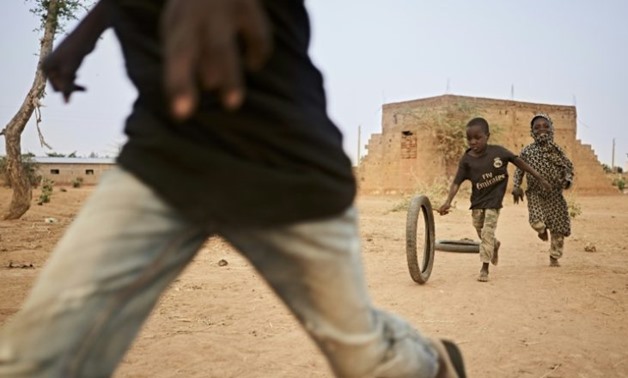
Two months ago, all 400 inhabitants of the Malian village Toou grabbed a few belongings and fled fighting between armed groups - AFP
SEVARE - 6 March 2020: Two months ago, all 400 inhabitants of the Malian village Toou grabbed a few belongings and fled fighting between armed groups, leaving their homes behind among the ghosts of the country's war.
Today, they sleep in an abandoned school in Sevare near the regional capital Mopti, packed into two buildings among vacant lots and a dirt road.
The men live in the building to the right; the women and children in the one to the left.
Toou's residents have joined a mass of more than a million people displaced by the violence in the center of the Sahel, in particular in Mali and neighboring Burkina Faso.
"The day is fine, but in the evening, there are people everywhere: here, there, over there and there. There are 10 of us sleeping in the same room," says Housseini Karembe, 65, waving his hand over the cramped living space.
Karembe and the others left Toou on January 5 when months of tension between traditional Dogon hunters and jihadists finally reached the village, spelling its doom.
Summoned by the jihadists and ordered to leave, the entire village's population -- 400 men, women and children -- fled with almost nothing, and walked the 26 kilometers (16 miles) to Sevare through the bush and blazing sun.
Karembe sits, leaning against the wall, in an old classroom where the chalk-marked blackboard is a reminder of the children who once studied there. Beside him crackles an old radio.
"We need tents, we can't stay like this in a school," said Karembe, a marabout or village elder, who taught young people the Koran before they fled.
After escaping with little more than cooking pots, some are embarrassed about their situation.
"We have a roof over our heads and we have something to eat," said one resident. "We mustn't complain too much."
'The growing war'
Mali's war erupted in 2012 when Tuareg rebels supported by armed Islamists took over the desert north of the country. The rebels were then outmaneuvered by their Islamist allies and the French military intervened to push them back.
The conflict has since swept into the center of Mali and spilled into neighboring Burkina Faso and Niger, inflaming ethnic tensions along the way.
More than 5,000 French troops, a regional G5 Sahel military cooperation deal and a UN peacekeeper mission in Mali have not been enough to contain the violence.
For Toou's 400 residents, that meant leaving their lives and homes behind.
Toou inhabitants receive coupons from the World Food Programme each month to buy food. A few pots the group use to cook sit in the school courtyard.
"These are the only objects we were able to take when we fled. Things to cook with," says Telemo Sombor Ga, 55, the brother of the village chief.
For months, Toou had been caught between the jihadists and the dozos, the traditional Dogon hunters who have united into a militia claiming to defend the population against jihadists in the absence of the state.
The dozo militia has styled itself as the bulwark against the jihadists led by Amadou Koufa, a Fulani imam who took up arms in 2015 and trained hundreds of young people under the banner of Al-Qaeda.
Direct clashes, sporadic in the past, have become more frequent. Before, jihadists often passed through Toou to preach, but "they left us alone," says Telemo Sombor Ga.
'Caught in the crossfire'
Everything changed when the dozo militiamen settled on the hill not far from Toou on September 18. From then, tensions only increased.
"We were caught in the crossfire," Ga says. "Even women could not go into the bush, no one could go out. We were stranded."
Soon the jihadists attacked the dozo camp on motorcycles and shots echoed from the hill. In Toou, residents hoped to stay out of the conflict.
But the jihadists later descended on the village, telling residents to leave.
"Toou no longer exists today," said one old man.
In the school, a semblance of life has resumed. Dozens of children run around playing, the women are busy around the pots. But all wonder about their future.
"We feel foreign here," says Aminata Karembe, 18, granddaughter of the marabout. She followed his Koranic education, dreaming of continuing in the family business one day.
"For now, it's a wasted dream."


Comments
Leave a Comment